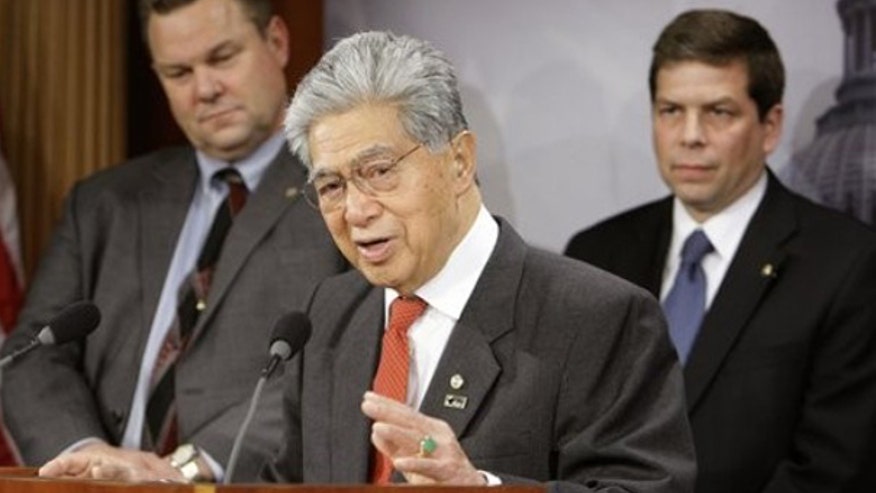
Sen. Daniel Akaka, D-Hawaii, center, accompanied by Sen. Jon Tester, D-Mont. , left, and Sen. Mark Begich, D-Alaska, gestures during a news conference on Capitol Hill in Washington, Monday, Nov. 9, 2009. (AP)
A bill that would give native Hawaiians the same right as Native Americans is halfway through the congressional process but opponents say the legislation is divisive and would turn over valuable land and resources out of U.S. hands. ;
In an overwhelming win, the Native Hawaiian Government Reorganization bill, also known as the Akaka bill for four-term Sen. Daniel Akaka, passed the House Tuesday with a 245-164 vote. ;
The fate of the legislation now rests in the hands of Senate leaders, where it has met challenges before.
The bill would grant federal recognition to Native Hawaiians, allowing them to form their own sovereign government similar to American Indians and Native Alaskans, giving them the power to negotiate over land use and cultural preservation. It would instantly create the second largest native “tribe” in the United States with almost 400,000 members — including roughly 20 percent of Hawaii’s residents based solely on their Polynesian heritage. ;
But many say the bill’s biggest impact lies in the amount of ‘ceded’ lands the state and federal government may be required to transfer to the new Hawaiian nation. About 1.8 million acres were ‘ceded’ when Hawaii became a state. Some of those lands are expected to be returned to the native Hawaiians under the Akaka bill.
Click here to see a map of the lands that would be transferred under the Akaka bill.
The other controversial element of the bill involves the Office of Hawaiian Affairs. It administers 160 programs worth tens of millions of dollars designed to benefit native Hawaiians.
However, thanks to the Supreme Court’s decision in Rice v. Cayetano, these race-based programs are vulnerable to legal challenge and could be eliminated without protections of the Akaka bill. ;
This includes programs like ALU LIKE, Inc., an advocacy group for native Hawaiians, and Hui No Ke Ola Pono, one of five native Hawaiian health care systems.
Native Hawaiians would not be allowed to alter any federal or state law. However, they have the authority to govern prior to negotiations with the state.
Any new noncommercial government activities, services and programs run by Hawaiians would not be subject to state or county regulation — a change from the bill’s original version.
Congress has been debating the measure since 2000 and while it has easily cleared the House three times, it has yet to pass the Senate.
Supporters say America has a moral obligation to let Native Hawaiians govern themselves just like American Indians, since they claim U.S. troops illegally overthrew the Hawaiian monarchy in 1893, something President Clinton apologized for in 1993 under the Hawaiian Apology Resolution.
But opponents point to fears over transfers of valuable land belonging to the state and federal government to new sovereign nations.
Gov. Linda Lingle, a strong Republican supporter of the original measure, pulled her support for the legislation on Tuesday, saying that the bill has changed and the amendments will hurt Hawaii.
“Under the current bill, the native Hawaiian governing entity has almost complete sovereign immunity from lawsuits, including from ordinary tort and contract lawsuits, and I do not believe this makes sense for the people of Hawaii,” Lingle said.
“My decision to not support the current version of the Akaka Bill is done with a heavy heart, because I so strongly believe in recognition for native Hawaiians.”
Other opposing voices spoke out on the House floor. Rep. Tom McClintock, R-Calif., said if passed the bill would allow any other racial group to set up a separate government.
“There is no more effective way to destroy a nation than to divide its people by race and accord them different rights,” McClintock said.
In a recent Zogby poll, only 34 percent of island residents said they support the Akaka bill.
Jere, a native Hawaiian, argued that the bill would unnecessarily divide the Aloha state.
“I oppose the Akaka Bill because it is going to create a race-based government where there never existed one before.”
In a statement issued after the vote, Akaka, who authored the bill, said he is certain “the bill protects the interests of all the people in Hawaii. The bill passed today specifically says ‘members of the Native Hawaiian governing entity will continue to be subject to the civil and criminal jurisdiction of federal and state courts.'”
Retiring Rep. Neil Abercrombie, D-Hawaii, agreed, saying that the state and federal governments are “well protected” and in no danger of losing their own sovereignty or capacity to enforce the law.
With the legislation still awaiting Senate passage, many say that the Democrat majority gives the bill the greatest chance of passage than ever before. President Obama has already committed to signing the bill if brought to his desk.
“Hawaii has always acknowledged and celebrated diversity, and an important part of Hawaii’s culture is the Native Hawaiian people.” Obama, who was born in Hawaii, said in a statement. For this reason, I am proud to support Senators Daniel Akaka and Daniel Inouye in their efforts to extend the federal policy of self-governance and self-determination to Native Hawaiians.”

